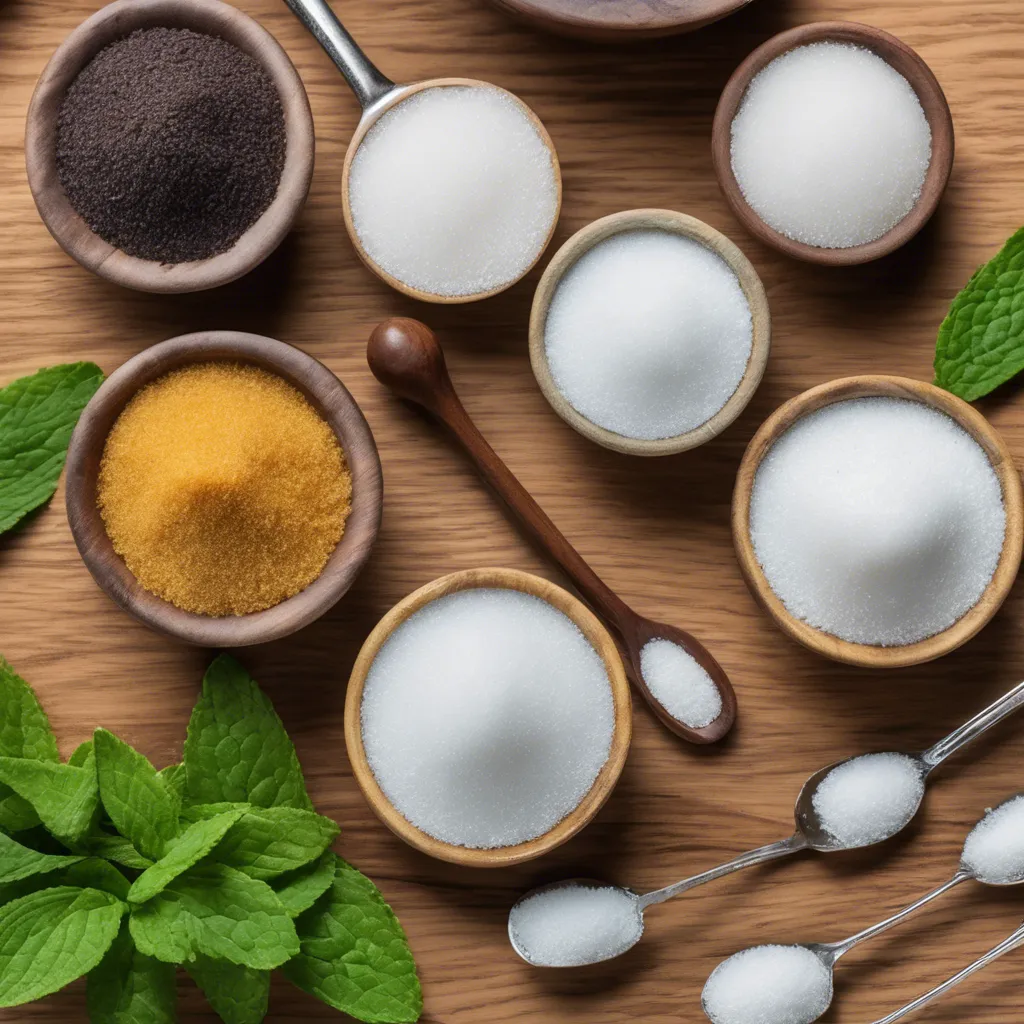Table of contents
- Delving into the Science of Sugar Substitutes
- Navigating the World of Sugar Substitutes: How to Choose the Best Option
- The Benefits of Adding Sugar Substitutes to Your Diet
- Unlocking the Secret: How Sugar Substitutes Can Manage Your Blood Sugar Levels
- Exploring the Risks and Safety Precautions for Potential Side Effects
Are you looking for healthier alternatives to sugar? Look no further! In this comprehensive guide, we will explore various sugar substitutes available in the market. From natural options like stevia and monk fruit to artificial sweeteners like sucralose and aspartame, we'll discuss their benefits, potential drawbacks, and how they can fit into a balanced diet. Say goodbye to excessive sugar intake and join us on the journey towards better health.
Delving into the Science of Sugar Substitutes
Are you curious about the various types of sugar substitutes available on the market? Whether you're looking to reduce your sugar intake or manage a health condition, sugar substitutes can be a good alternative to traditional sugar. Let's delve into the science of sugar substitutes and explore the different options available:
-
1. Artificial Sweeteners
Artificial sweeteners like aspartame, saccharin, and sucralose provide zero or very low-calorie alternatives to sugar. They are much sweeter than sugar and can be used in small quantities. However, some studies suggest potential health risks associated with long-term artificial sweetener consumption.
-
2. Natural Sweeteners
Natural sweeteners like stevia and monk fruit extract are derived from plants and provide a calorie-free or low-calorie alternative to sugar. They are considered safe for consumption and do not impact blood sugar levels. These sweeteners are increasingly popular among individuals looking for natural alternatives.
-
3. Sugar Alcohols
Sugar alcohols like erythritol, xylitol, and sorbitol are commonly used in sugar-free products. They have fewer calories than traditional sugar and do not cause a significant spike in blood sugar levels. However, high consumption of sugar alcohols can lead to digestive issues.
-
4. Plant-Based Sweeteners
Plant-based sweeteners like agave nectar, maple syrup, and coconut sugar are natural alternatives with a slightly higher nutrient profile than traditional sugar. While they still contain calories, they are often less processed and offer a more natural flavor.
-
5. Artificial/Natural Sugar Blends
Some sugar substitutes on the market combine artificial and natural sweeteners to provide a taste similar to sugar with fewer calories. These blends offer the best of both worlds and can be a suitable option for those who desire the taste of sugar without the full caloric content.
Navigating the World of Sugar Substitutes: How to Choose the Best Option
Choosing the right sugar substitute can be overwhelming with the myriad of options available. However, by considering a few key factors, you can find the best option to suit your needs.
- Taste: One of the primary factors to consider is the taste of the sugar substitute. Some substitutes have a similar taste to sugar, while others may have a slightly different or artificial aftertaste. It's important to choose one that you find pleasant and enjoyable.
- Caloric content: If you're looking to reduce your calorie intake, it's crucial to select a sugar substitute that is low or zero-calorie. Some sweeteners, such as stevia or monk fruit, provide sweetness without the added calories.
- Health effects: Consider the impact of the sugar substitute on your health. Some artificial sweeteners, like aspartame or saccharin, may have potential health risks when consumed in large quantities. Opt for natural alternatives, such as erythritol or xylitol, which are generally considered safer.
- Usage in cooking and baking: If you plan to use the sugar substitute for cooking or baking, ensure that it is heat stable. Some sweeteners, like sucralose, can withstand high temperatures, making them suitable for this purpose.
- Availability and cost: Check the availability and cost of the sugar substitute. Some substitutes may be harder to find or more expensive than others. Consider your budget and accessibility when making a choice.
The Benefits of Adding Sugar Substitutes to Your Diet
When using sugar substitutes in baking and cooking, it's important to consider the sweetness level and the texture they provide. Start by using less sugar substitute than the amount of sugar called for in a recipe, as some substitutes are sweeter than sugar. Also, be mindful of the different forms of sugar substitutes and adjust your recipe accordingly. For a better texture, add moisture to the recipe when using sugar substitutes to prevent dryness. Lastly, experiment and taste-test your creations to find the perfect balance of sweetness and flavor.
Unlocking the Secret: How Sugar Substitutes Can Manage Your Blood Sugar Levels
Managing blood sugar levels is crucial for individuals with diabetes. Sugar substitutes offer a promising solution to prevent blood sugar spikes, without compromising on taste or enjoyment. Here's how sugar substitutes can be used to manage your blood sugar levels effectively:
-
Low Glycemic Index
Sugar substitutes have a low glycemic index, meaning they are digested and absorbed more slowly than regular sugar. This slow absorption helps prevent sudden spikes in blood sugar levels and provides a more steady release of glucose into the bloodstream.
-
No Insulin Response
Unlike sugar, most sugar substitutes do not trigger an insulin response in the body. Insulin is the hormone responsible for regulating blood sugar levels. As a result, using sugar substitutes can help individuals reduce their insulin requirements and maintain more stable blood sugar levels throughout the day.
-
Weight Management
Obesity is a risk factor for developing diabetes and can worsen blood sugar control. Sugar substitutes contain fewer calories than regular sugar, making them a valuable tool in managing weight. By reducing caloric intake, sugar substitutes can aid in weight loss and contribute to better blood sugar management.
-
Flexible Food Choices
Using sugar substitutes allows for a wider variety of food choices. Individuals with diabetes often face restrictions on consuming high-sugar foods. By substituting sugar with sugar substitutes, it is possible to enjoy sweet treats and beverages without the worry of sudden blood sugar spikes.
-
Enhanced Diabetes Control
Sugar substitutes can be a helpful tool in achieving better diabetes control. By incorporating sugar substitutes into the diet, individuals can have greater control over their carbohydrate intake and manage their blood sugar levels more effectively. This can lead to improved overall health outcomes and reduce the risk of complications associated with diabetes.
Exploring the Risks and Safety Precautions for Potential Side Effects
In the pursuit of healthier dietary habits, many people turn to sugar substitutes as an alternative to traditional sugar. While these substitutes offer sweetness without the added calories, it's important to be aware of their potential side effects. Here are some possible side effects of consuming sugar substitutes:
-
Digestive issues
Some sugar substitutes, such as sorbitol and xylitol, are known to cause digestive problems like bloating, gas, and diarrhea. These sweeteners can be particularly problematic for individuals with irritable bowel syndrome (IBS).
-
Metabolic effects
Certain artificial sweeteners like aspartame and saccharin may impact metabolism and appetite regulation. Studies suggest that these sweeteners can interfere with the body's ability to process sugars appropriately, potentially leading to weight gain and increased hunger.
-
Headaches
For some individuals, consuming sugar substitutes may trigger headaches or migraines. While the exact reason is not well understood, it is believed that certain sweeteners, such as aspartame, may stimulate neurotransmitters in the brain and contribute to headaches.
-
Controversial effects on health
There is ongoing debate and conflicting evidence regarding the long-term health effects of sugar substitutes. Some studies suggest a potential link between artificial sweeteners and an increased risk of conditions like obesity, type 2 diabetes, and cardiovascular disease. However, more research is needed to establish concrete conclusions.
-
Allergic reactions
In rare cases, individuals may experience allergic reactions to certain sugar substitutes, particularly those derived from natural sources like stevia. Symptoms can range from mild rashes or itching to severe allergic reactions that require immediate medical attention.
In conclusion, sugar substitutes offer a wide range of options for individuals looking to reduce their sugar intake without sacrificing taste. From natural alternatives like stevia and monk fruit to artificial sweeteners like aspartame and sucralose, there is something for everyone's preference and dietary needs. While sugar substitutes can help control blood sugar levels and aid in weight management, it is essential to use them in moderation and be aware of potential side effects. It is always recommended to consult with a healthcare professional before making any significant changes to your diet. Overall, with proper knowledge and responsible use, sugar substitutes can be a valuable tool in maintaining a healthy lifestyle.
Frequently asked questions related to sugar substitutes benefits
What are sugar substitutes?
Sugar substitutes are sweeteners that can be used as alternatives to sugar in food and drinks.
Are sugar substitutes safe?
In general, sugar substitutes that have been approved for use by regulatory authorities such as the FDA are considered safe when consumed in moderation. However, some people may have sensitivities or allergies to certain sugar substitutes, so it's always best to consult with a healthcare professional if you have any concerns.
Can sugar substitutes be used in baking?
Yes, sugar substitutes can be used in baking. However, it's important to note that sugar substitutes may behave differently than sugar in baking recipes. They may not provide the same volume or texture, so it may be necessary to make adjustments to the recipe accordingly.
Do sugar substitutes have any nutritional benefits?
Sugar substitutes are often low in calories or have no calories at all, which can be beneficial for those trying to reduce their calorie intake. Some sugar substitutes also have a minimal impact on blood sugar levels, making them suitable for individuals with diabetes or those looking to manage their blood sugar.
Are there any potential drawbacks to using sugar substitutes?
While sugar substitutes can be a helpful tool in reducing sugar consumption, there are some potential drawbacks to be aware of. Some people may experience gastrointestinal issues when consuming sugar alcohols in large quantities. Additionally, relying too heavily on sugar substitutes may still contribute to cravings for sweet foods and beverages.
How should sugar substitutes be used?
Sugar substitutes should be used in moderation, just like any other food or ingredient. It's important to read labels and follow recommended serving sizes to avoid overconsumption. As with any dietary change, it's best to consult with a healthcare professional or registered dietitian if you have specific health concerns or questions.
Why would someone use a sugar substitute?
There are several reasons why someone might choose to use a sugar substitute. Some people use them to reduce their calorie intake, manage their blood sugar levels, or control their weight. Others may use them to limit their consumption of added sugars or because they have dietary restrictions.
What are some common types of sugar substitutes?
Some common types of sugar substitutes include artificial sweeteners (such as aspartame, sucralose, and saccharin), natural sweeteners (such as stevia and monk fruit extract), and sugar alcohols (such as erythritol and xylitol). Each type has its own characteristics and may be more suitable for certain applications than others.
Do sugar substitutes taste like sugar?
Sugar substitutes can have different tastes compared to sugar. Some may have a similar sweetness, while others may have a slightly different flavor profile. It ultimately depends on the specific sugar substitute and individual taste preferences.







